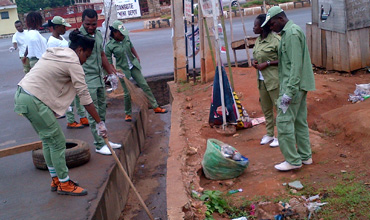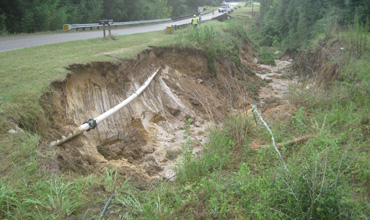References:
[1.] Abed, G.
& S. Gupta. 2002. „The economics of corruption: an overview‟, in Abed, G. & S. Gupta (eds).
Governance, corruption and economic performance, New York: International
Monetary Fund.
[2.] Abuarqub, M
(2009), Islamic imperatives to curb corruption and promote sustainable
Development: Islamic Relief worldwide, Birmingham.
[3.] Achebe, C.
1983. The trouble with Nigeria, London: Heinemann.
[4.] Achilles,
C. M.; Lintz, M.N.; and Wayson, W.W. "Observations on Building Public
Confidence in Education." EDUCATIONAL EVALUATION AND POLICY ANALYSIS 11
no. 3 (1989): 275-284.
[5.] Adedeji, A.
1990. The African alternative, Addis Ababa: ECA.
[6.] Ahluwalia,
P. 2000. Politics and post-colonial theory: African reflections. Routledge:
London.
[7.] Alesina, A.
& Weder, B. 2002. „Do corrupt governments receive less foreign aid?‟ American Economic Review, 92:
1126-1137.
[8.] Akyeampong,
A. (2005), Vocationalisation of Secondary Education in Ghana in Lauglo, J and
Maclean, R (eds) Vocationalisation of Secondary Education Revisited,
UNEVOC/World Bank: Springer.
[9.] American
Society for Information Science & Technology, 55(3), 228-237.
[10.]
Atchoarena, D. ans Delluc, A. (2002), Revisiting Technical and Vocational
Education in sub – Sahara Africa: an Update on Trends, Innovations and
Challenges, UNESCO, IIEP.
[11.] Banach,
Banach, and Cassidy. THE ABC COMPLETE BOOK OF SCHOOL MARKETING. Ray Township,
MI: Author, 1996.
[12.] Bateman,
Thomas s., and Snell, Scott A. (1996) Management: Building competitive
advantage, London: Irwin.
[58
[13.] Bennel, P.
(2007), Promoting Livelihood Opportunities for Rural Youth, Paper presented at
Roundtable 3: Generating remunerative livelihood opportunities for rural youth,
IFAD Governing Council 2007.
[14.] Berg, B.L.
(2001). Qualitative Research Methods for the Social Sciences. Boston: Allyn And
Bacon
[15.] Black,
Thomas R. (1993) Evaluating social science research, London: Sage.
[16.] Bishop,
.G. (1985), Curriculum Development: A Textbook for students, London:
Macmillian.
[17.]Bradley, F.
(2003).Strategy Management in the customer driven Organization: London: Wiley.
[18.] Braun , A.
R., J. Jiggins, N. Roling, Van den Berg, H. and P. Snijiders (2005), A Global
Survey and Review of Farmer Field School Experiences. International Livestock
Research Institute, Nairobi.
[19.] Braun, A.
R., and Duveskog, D. (2008), The Farmer Field School Aproach – History, Global
Assessment and Success Stories, Paper commissioned by IFAD (Draft 2008).
[20.] Brink and
Berndt (2004).Customer relation management and customer service, Lansdowne:
Juta.
[21.] Brodhead,
C. W. "Image 2000: A Vision for Vocational Education." VOCATIONAL
EDUCATION JOURNAL 66, no. 1 (January 1991): 22-25.
[22.] Brown, S.
et al (2004), Strategic operations Management: Britain library: Norfolf.
[23.] Bunyi, G.
W. (2004), Gender Disparities in Higher Education in Kenya: Nature, Extent and
the Way Forward‟, Paper
presented at the African Symposium Vol. 1, March 2004.
[24.] Buzzell,
C.H. "Let Our Image Reflect Our Pride." VOCATIONAL EDUCATION JOURNAL
62, no. 8 (November–December 1987): 10.
[25.] Cammillieri,
J. (2007), Le micro enterprise rurale en Afrique: De la survie a la croissance,
le cas rwandais. L‟Harmattan.
[26.] Carmody,
B. (2004), The Evolution of Education in Zambia: Book world, Lusaka.
[27.] Charles,
C.M. (1992), Building Classroom Discipline, 4th edn, London: Longman.
[28.] Charner,
l. (1996), study of School – to – Work Reform Initiatives, Washington, DC:
Academy for Educational Development. ERIC Document Reproduction Service (Number
397 550).
[29.] Cole, G.A.
(1997). Strategic management: Theory and Practice, 2nd Edition, London: Letts.
[30.] Cole, G.A.
(1996). Management: Theory and Practice, 5th Edition, London: ELST-Continuum.
[31.] Commission
on Africa, 2005. Our common interest, http://commissionforafrica.org (visited
12 March 2005).
[32.]
Commonwealth of Learning (2001). Addressing the challenges of TVET. Vancouver,
Canada: Author.
[33.] Curry and
Kadasa, N (2002). Focusing on key elements of TQM- evaluation for
sustainability: The TQM magazine, 14 (4), 207-216.
[34.] Dahl, J.
(2003), Evaluating Distance Education in the 21st Century, Distance Education
Report, 7(8): 4 -5.
[35.] Dale H.
Besterfield et.al (2003) Total quality management: Pearson Prentice Hall,
India.
[36.] Day,
George S., Reibstein, David, J., and Gunther, Robert E. (Eds), (1997). Wharton
on Dynamic competitive strategy, New Jersey: Wiley.
[37.] Denzin,
Norman K (1970) the research act: A theoretical Introduction to sociological
methods, Chicago: Aldine.
[38.] De Wever,
B., Schellens, T., Valcke, M., & Van Keer, H. (2006). Content analysis
[39.] East African
Standard (2002), Financial Standard, Education Survey, 6 August, Nairobi:
Standard Newspaper Limited.
[40.]
Effectiveness for exploring cognitive behaviours. Journal of the American
Society for Information Science, 51(8), 734-744.
[41.] Evans, R.,
Joel and Berman, B. (1990). Marketing. 4th edition, New York, Maxwell
Macmillan.
[42.] FAO/WFP
(2007), Getting started! Running a junior farmer field and life school.
FAO/WFP, Rome, ltaly.
[43.] Fluitman,
F. (2005), Poverty reduction, decent work, and the skills it takes or: towards
correcting a partial view of training needs in African development.
[44.] Fluitman,
F. (2002), unpublished plenary discussion on the draft of the World Bank‟s Vocational Skills Development in Sub-
Saharan Africa: Synthesis of regional review. Edinburg University, September
2002.
[45.] Fien J. et
al. (2009). Work, Learning and Sustainable Development: Opportunities and
Challenges. Dordrech: Springer.
[46.] Francis B.
and Skelton. C. (2010), Investigating Gender: Contemporary perspective in
Education.
[47.] Freire, P.
(2000), Pedagogy of the Oppressed, 30th anniversary edition, Continuum, New
York.
[48.] Foster, A.
(2004). A nonlinear model of information-seeking behaviour. Journal of the
[49.] Galtung,
F. 2005. “Measuring the immeasurable: Boundaries and functions of (Macro)
corruption indexes”, in F. Galtung & C. Sampford (eds). Measuring
corruption, London: Ashgat.
[50.] Gay. L. R.
(1996), Education Research: Competencies for Analysis and Application, 5th Ed,
New Jersey: Prentice Hall.
[51.] George.
M., and Jones, G.R. (2006), Contemporary Management, creating value in
organizations 4th Edition: Mc Graw Hill Irwin, Boston.
[52.] Ghosh.
B.N., (2008), Scientic Method and Social Research: Sterling, Dehi-110020.
[53.] Godfrey B.
and Charles J. (2002). Educational planning and Management in small States
Concepts and Experiences: Published by the Commonwealth Secretariat. London
SW1Y 5 HX, United Kingdom.
[54.] Hajedini,
H and Roth, C., (2008), Combating corruption in Kosovo: UNDP Kosovo, Peyton
place 14, pristine.
[55.] Hannagan,
T., (2008), Management Concepts and Practices 5th Edition: Pearson Education
ltd England.
[56.] Hanlon, J.
1991, Mozambique: who calls the shots“, Oxford: James Currey.
[57.] Hanlon, J.
1996, Peace without profit: how the IMF blocks rebuilding in Mozambique,
Oxford: James Currey
[58.] Hanlon, J.
2002. ‟Bank corruption
becomes a site of struggle in Mozambique‟,
Review of African Political Economy, 29(91): 53-72.
[59.] Hanlon, J.
2004.‟Do donors promote corruption? the case
of Mozambique‟ Third World Quarterly, 25(4): 747-763.
[60.] Harsch, E.
1993. „Accumulators and democrats: Challenging state corruption in Africa‟,
The Journal of Modern Africa Studies, 31(1): 31-48.
[61.]
Hollenbeck, K. (1996), School – to – Work Programs to facilitate youth
employment and Learning, Kalamazoo, MI: Upjohn Institute for Employment
Research. (ERIC Document Reproduction Service Number 394 046)
[62.] Hope, K.
2000. Corruption and development in Africa, in K. Hope & B. Chikulo (Eds.),
Corruption and development in Africa: Lessons from country case studies,
London: Macmillan.
[63.] Hussey,
J., and Hussey R. (1997) Business research: A practical guide for undergraduate
and postgraduate students, Hampshire: Palgrave.
[64.] IFAD
(2008), Gash Sustainable Livelihoods Regeneration Project – Community
Development and Capacity Building Component: Assessment of the Capacity
Building Interventions and the Animal Health Agents.
[65.] IFAD
(2007), Republicque du Mali, E‟valuation du
programme de pays Rapport NO. 1905 – ML.
[66.] IFAD
(2005) UWESO Development, 2000 – 2005 – Program Completion Evaluation Report.
[67.]
Information and communication University Study Manual (2012); Introduction to
Microeconomics: School of Humanities Department of Economics.
[68.] James A.
F.Stoner et.al (2007) Management: Pearson Prentice Hall India
[69.] Jobber, D.
(2004). Principles and practice of marketing, 4th edition, London: Mc Graw Hill
[70.] Kankwenda,
M. 2004. The AAF-SAP: first step on the African path to sustainable human
development, in B. Onimode, et.al African development and governance strategies
in the 21st century, London: Zed Books.
[71.] Keefer, P
& Knack, S. 1995. „Institutions and economic performance: cross-country
tests using alternative institutional measures‟, Economics
& Politics, 7: 207-227).
[72.] Kerre,
B.W. (1996), Promotion of Equal Access of Girls and Women to Technical and
Vocational Education, Paris: UNESCO.
[73.] Kerre,
B.W. (1995), Technical and Vocational Education in Africa: A Synthesis of Case
Studies, Dakar: UNESCO.
[74.] Kerre,
B.W. (2001), Science, Technology and Development, Paper presented to the Third
World Studies (ATWS) Kenya Chapter Conference held at Egerton University,
Kenya, 17 – 19 September 2001.
[75.] Kincheloe,
Joe L. Toil and Trouble: Good Work, Smart Workers, and the Integration of Academic
and Vocational Education. New York: Peter Lang Publishing. (1995)
[76.] Kincheloe,
Joe L. How Do We Tell the Workers? The Socio-Economic Foundations of Work and
Vocational Education. Boulder, CO: Westview Press. (1999)
[77.] King, E.M.
and Hill, M.A. (1997), Attitudes of Trainees and Trainers Towards the 8 – 4 – 4
Secondary Schools‟ Power Mechanics Subject in Kenya
[78.] King, K.,
McGrath, S. and Rose, P. (2007) Beyond the basics: Educating and training out
of poverty, International Journal of Educational Development 27, 349 – 357.
[79.] King, K.,
and Palmer R. (2006), Skills Development and Poverty Reduction: The State of
the Art. Centre of African Studies, University of Edinburgh.
[80.] Klasen, S.
(2002), Insert of the Holy Grail: How to Achieve Pro – poor Growth? Munich:
University of Munich, Department of Economics.
[81.] Kotler, P.
(1999). Marketing: How to create win and dominate markets, London: FP-Free
Press.
[82.] Kotler, P.
(2003). Marketing Management, 11th edition, London: Prentice hall.
[83.] Kotler, P.
(2003). Marketing Management, 11th edition, London: Prentice hall.
[84.] Koros,
J.K. (2007), Learners‟ Perception of Technical and Vocational
Education in Kenya: A Case Study of Nakuru District, M. Phil Thesis; Moi
University.
[85.] Lauglo,
Jon; Maclean, Rupert (Eds.) "Vocationalisation of Secondary Education
Revisited". Series: Technical and Vocational Education and Training:
Issues, Concerns and Prospects , Vol. 1. Springer. (2005)
[86.] Lee, K. W.
(2006), Effectiveness of government‟s occupational
skills development strategies for small – and medium – scale enterprises: A
case study of Korea, international Journal of Educational Development 26 (2006)
278 – 294.
[87.] Lockheed,
M.E., Jamison, D.T. and Lau, L.J. (1980), “Farmer education and farm
efficiency”. In: Economic Development and cultural Change, 29, 37 – 76.
[88.] Matembe,
M. (2010), Good Governance for Ombudsman and Anti corruption: CAFRA, Tangier,
Morocco.
[89.] Mayoux, L.
(2005), Learning and Decent Work for All: new directions in training and
education for pro – poor growth InFocus Programme on Skills, Knowledge and
Employability, ILO: Geneva.
[90.] Mayring,
P. (2000). Qualitative content analysis. Forum: Qualitative Social Research,
1(2). Retrieved July 28, 2008, from
http://217.160.35.246/fqs-texte/2-00/2-00mayring-e.pdf.
[91.] McGrath,
S. (2005), The Challenge of Rural Skills Development. Debates in Skills
Development, Paper 10, Working Group FOR International Cooperation in Skills
Development. ILO/NORRAG/SDC: Geneva.
[92.] Michael,
B. 2004. „What do African donor-sponsored anti-corruption programs teach us
about international development in Africa?‟ Social Policy
and Administration, 38(4): 320-345.
[93.] Miles, M.,
& Huber man, A.M. (1994). Qualitative Data Analysis. Thousand Oaks, CA:
Sage Publications.
[94.]
Minichiello, V., Aroni, R., Timewell, E., & Alexander, L. (1990). In-Depth
Interviewing
[95.] Ministry
of Science Technology and Vocational Training: March 2005 -2012 Newsletters:
Zambia.
[96.] Ministry
of Science Technology and Vocational Training: March 2005 Newsletters: Zambia.
[97.] Ministry
of Science Technology and Vocational Training: September 2005 Newsletters:
Zambia.
[98.] Ministry
of Science Technology and Vocational Training: September 2006 Newsletters:
Zambia.
[99.] Ministry
of Science Technology and Vocational: March 2007 Newsletters: Zambia.
[100.] Ministry
of Science Technology and Vocational Training: January 2008 OAG -Newsletters:
Zambia.
[101.] Ministry
of Science Technology and Vocational Training: March 2008 Newsletters: Zambia.
[102.] Ministry
of Science Technology and Vocational Training: March 2009 Newsletters: Zambia.
[103.] Moses O.
Oketch (2006). School of Lifelong Education and International Development
Institute of Education: University of London.
[104.] Munroe,
M. (2002), Overcoming Crisis: Destiny Image, Bahamas. Allen, B., & Reser,
D. (1990). Content analysis in library and information science
[105.] Munroe,
M., (2005), Understanding your potential: Destiny, Bahamas.
[106.] Musaazi,
J.C.S. (2001), Business, Technical and Vocational Education and Training
(BTVET) as a Catalyst for Development in Africa; in The Status and Challenges
of Business, Technical and Vocational Education and Training (BTVET) in Uganda
(10 – 13) December 2001) Country report; Uganda.
[107.] Glaser,
B.G., & Strauss, A.L. (1967). The Discovery of Grounded Theory: Strategies
for
[108.]
Qualitative Research. New York: Aldine.
[109.] Hsieh,
H.-F., & Shannon, S.E. (2005). Three approaches to qualitative content
analysis.
[110.]
Qualitative Health Research, 15(9), 1277-1288.
[111.] Lincoln,
Y.S., & Guba, E.G. (1985). Naturalistic Inquiry. Beverly Hills, CA: Sage
Publications.
[112.] Ndulo, M.
2003. „The democratization process and structural adjustment in Africa‟,
Indiana Journal of Global Legal Studies, 10: 315-368.
[113.]
Neuendorf, K.A. (2002). The Content Analysis Guidebook. Thousand Oaks, CA: Sage
Publications.
[114.] O'Connor,
P.J., and Trussell, S.T. "The Marketing of Vocational Education."
VOCATIONAL EDUCATION JOURNAL 62, no. 8 (November–December 1987): 31-32.
[115.] OECD.
(2008). more Than Just Jobs: Workforce Development in a skills Based economy.
[116.] Okaka,
P.O. (1997), Technical and Vocational Education and Training Policy in Kenya:
Under the Sun or in the Shade? Jua Kali in African Countries, Berlin: UNEVOC/UNESCO.
[117.] Okaka,
P.O. (2001), Technical and Vocational Education and Training in Kenya, Paper
presented on the sub – regional workshop on the theme Promotion and Reform of
Technical and Vocational Education and Training in Africa, Kampala.
[118.] Onimode,
B. 2004. Mobilization for the implementation of alternative development
paradigms in 21st century, in B. Onimode, et. al African development and
governance strategies in the 21st century, London: Zed Books.
[119.] Op, de
Beke, A. 2000. Anticorruption initiatives of the IMF. Joint ADB/OECD
publication. Manila. http://www.oecd.org/document/28/0,2340,fr_2649_37447_1947036_1_1_1_37447,00.html
(visited 14 March 2005)
[120.] Palmer,
R. (2007) Skills for work? From skills development to decent livelihoods in Ghana‟s
rural informal economy. International journal of Education Development 27
(2007) 397-420.
[121.] Patton,
M.Q. (2002). Qualitative Research and Evaluation Methods. Thousand Oaks, CA:
Sage.
[122.] Picasso,
P. (1966). Quoted in Hélène Parmelin, “Truth,” In Picasso Says. London: Allen
& Unwin (trans. 1969).
[123.] Porter,
Michael E. (1980). Competitive strategy. Techniques for analyzing industries
and competitors, London: FP Free Press.
[124.] Porter,
Michael E. (2004). Competitive Advantage. Creating and sustaining superior
performance, London: FP Free Press.
[125.] Schamber,
L. (2000). Time-line interviews and inductive content analysis: Their
[126.] Schamber,
L. (1991). Users‟ Criteria for Evaluation in Multimedia
Information Seeking and Use Situations. Ph.D. dissertation, Syracuse
University.
[127.]
Schilling, J. (2006). On the pragmatics of qualitative assessment: Designing
the process for content analysis. European Journal of Psychological Assessment,
22(1), 28-37.
[128.] Smith, D.
„Kinship and corruption in contemporary Nigeria‟, Ethnos, 66(3):
344-364.
[129.] Smith,
H.W. (1975). Strategies of Social Research: The Methodological Imagination.
Englewood Cliffs, NJ: Prentice-Hall.
[130.] Reeves,
Diane Lindsey CAREER ACADEMY TOOLKIT. Raleigh, North Carolina: Bright Futures
Press, 2006.
[131.] Richard
G. Lipsey e.tal (2004) Economic; Oxford university press inl. New York.
[132.] Ries, E.
"To 'V' or Not to 'V': for Many the Word 'Vocational' Doesn't Work."
TECHNIQUES 72, no. 8 (November–December 1997): 32-36.
[133.] Ries, A.,
and Trout, J. THE 22 IMMUTABLE LAWS OF MARKETING. New York: HarperCollins
Publishers, 1993.
[134.] Riley, S.
2000. „Western politics and African realities: the new anti-corruption agenda‟,
in K. Hope & B. Chikulo (eds). Corruption and development in Africa:
lessons from country case studies, London: Macmillan.
[135.] Robbins,
S.P., and Couter, M. (2007), Management 9th Edition: Pearson Prentice Hall, New
Jersey.
[136.] Roeske,
J. (2003). Skills training strategies to combat worst forms of child labour in
formal economy: Ghana country study. Marseilles, France: International
Programme on the Elimination of Child Labour (IPEC).
[137.] Rowan,
L., et al (2002), Boys literacies and schooling: library of Congress Cataloging
in publication Data.
[138.] Sakala,
R. (2000), Beyond Political Rhetoric: ZPC, Lusaka.
[139.] Saunders,
M., Lewis, P., and Thorn hill, A. (2003). Research methods for business
students, 3rd edition, London: FT Prentice Hall.
[140.] Sharpe,
D. "Image Control: Teachers and Staff Have the Power to Shape Positive
Thinking." VOCATIONAL EDUCATION JOURNAL 68, no. 1 (January 1993): 26-27.
[141.] Shields,
C.J. "How to Market Vocational Education." CURRICULUM REVIEW
(November 1989): 3-5
[142.]
Silberman, H.F. "Improving the Status of High School Vocational
Education." EDUCATIONAL HORIZONS 65, no. 1 (Fall 1986): 5-9.
[143.] Smith,
S.E. (2012), WiseGeek: Conjecture Corporation.
[144.] Simiyu,
J. (2007), Introducing elearning as a strategy to increase Enrolment in TVET,
Paper presented at the 1st African UNESCO – UNEVOC Summit on Access and
Inclusion for TVET in Africa through New ICT – Based Solutions, 28 – 30 May,
Safari Park Hotel, Nairobi, Kenya.
[145.] Stan lake‟s
SJ Grant (2006); Introductory Economics: Person Education Limited, Inc. New
Jersey.
[146.] Stephen
P. Robbin et .al (2007) Management: Pearson Education, Inc.New Jersey
[147.] Stern,
Carl W., and Deimler, Michael S. (2006). The Boston consulting group on
strategy: Classic concepts and new perspectives, 2nd Edition, New Jersey:
Wiley.
[148.] Stokes,
D. (1997). Marketing: A case study approach, 2nd edition, London: Continuum.
[149.] Stoner,
F. et al (2009), Management 6th Edition: Pearson Education, Delhi 110092,
India.
[150.] Stuart .W
.R. et al (2005); Business Economics: Pearson Education Limited Edinburgh Gate.
[151.] Swarland,
J.R. (2000), learning for life, Work and the Future Stimulating Reforms in
Southern Africa through Sub – regional Cooperation, Workshop Paper,
UNEVOC/UNESCO/Ministry of Education, Botswana.
[152.] Taylor,
W.A. and Wright, G.H., (2003), a longitudinal study of TQM implementation:
factors influencing success and failure, Omega, 31, 97 – 111.
[153.] Taneja,
V.R. (2012), Educational Thought and Practice: Sterling, New Delhi 110092, and
India.
[154.] Technical
Education and Vocational Entrepreneurship Training: April 2003 Newsletters:
Zambia.
[155.] Technical
Education and Vocational Entrepreneurship Training: September 2005 Newsletters:
Zambia.
[156.] Technical
Education and Vocational Entrepreneurship Training: December 2006 Newsletters:
Zambia.
[157.] Technical
Education and Vocational Entrepreneurship Training: April 2009 Newsletters:
Zambia.
[158.] Technical
Education and Vocational Entrepreneurship Training: March 2009 Newsletters:
Zambia.
[159.] Technical
Education and Vocational Entrepreneurship Training: March 2010 Newsletters:
Zambia.
[160.] Technical
Education and Vocational Entrepreneurship Training: March 2011 Newsletters:
Zambia.
[161.] Technical
Education and Vocational Entrepreneurship Training: December 2011 Newsletters:
Zambia.
[162.] Technical
Education and Vocational Entrepreneurship Training: March 2012 Newsletters:
Zambia.
[163.] Technical
Education and Vocational Entrepreneurship Training: September 2007 Newsletters:
Zambia.
[164.] Technical
Education and Vocational Entrepreneurship Training: December 2008 Newsletters:
Zambia.
[165.] Technical
Education and Vocational Entrepreneurship Training: April 2010 Newsletters:
Zambia.
[166.] Technical
Education and Vocational Entrepreneurship Training: March 2010 Newsletters:
Zambia.
[167.] Technical
Education and Vocational Entrepreneurship Training: March 2010 Newsletters:
Zambia.
[168.] Technical
Education and Vocational Entrepreneurship Training: March 2013Newsletters:
Zambia.
[169.] Technical
Education and Vocational Entrepreneurship Training: April 2013 Newsletters:
Zambia.
[170.] Tesch, R.
(1990). Qualitative Research: Analysis Types & Software Tools. Bristol, PA:
Falmer Press.
[171.]
Thiagarajan, .T. and Zairi, M., (2001), A proposed model of TQM implementation
based on an empirical study of Malaysian industry, International Journal of
Quality & Reliability management, 19 (5), 508 – 523.
[172.] Tim
Hamagan (2008). Management Concept and Practices: Pearson Education Ltd,
prenticed Hall
[173.] Tuttle,
F.T. "Let's Get Serious about Image-Building." VOCATIONAL EDUCATION
JOURNAL 62, no. 8 (November–December 1987): 11.
[174.] UNESCO
(2004) Synthesis report: improving access, equity and relevance in technical
vocational education and training (TVET). Bangkok, Thailand: UNESCO.
[175.] UNEVOC
(2000), learning for Life, Work and Future: Stimulating Reform in Southern
Africa through Sub regional Co – operation, Gaborone: UNESCO.
[176.] UN
Conference for Sustainable Development. 2010. United Nations Conference for
Sustainable Development Rio 20. Available FROM Http://WWW.
Uncsd2010.org/index.php?option= com_content&id=91: the- history-
of-sustainable-development-in-the-united-nations&catid=55<emid-99(accesed
07 February 2011).
[177.] UNECE
n.d.United Nations Economic Commission for Europe. Htt://WWW.unece.org/env/pp/
(Accessed 16 February 2011)
[178.] UNESCO –
ILO (2002), Technical and Vocational Education and Training for the Twenty –
first Century, UNESCO and ILO Recommendations.
[179.] UNESCO –
UNEVOC (2006), Participation in formal technical and vocational education and
training programmes worldwide: an initial stastical study. Bonn, Germany.
UNESCO – UNEVOC International centre for technical and vocational education and
training.
[180.] UNESCO
Institute for Statistics (2007), Participation in Formal Technical and
Vocational Education and Training Programmes Worldwide – An Initial Stastical
Study. Montreal, Canada.
[181.]
UNESCO.2010.Education for sustainable development (ESD).
HTTP//WWW.unesco.org/en/esd/ (January 2011)
[182.] Utstein
Anti-corruption Resource Centre, 2005. Anti-corruption projects by agency
http://www.u4.no/projects/agency.cfm (visited 31 March 2005).
[183.] US
General Accounting Office, 2004. Foreign assistance. US anticorruption programs
in sub-Saharan Africa will require time and commitment, Report to the
subcommittee on African Affairs, committee on foreign relations, US Senate,
GAO-04-506, pp. i-67.
[184.] Van den
Berg, H. (2004). IPM Farmer Schools: A synthesis of 25 impact evaluations.
Wageningen. University. 53 pp.
[185.] Van Der
Wieele, T. and Brown, A., (2002), Quality management over a decade: A
longitudinal study, International Journal of Quality & Reliability
management, 19(5), 508 – 523.
[186.] Watter J.
Wessels 2006; Economic; Library of Congress Cataloging in – publication Data.
[187.] Weber,
R.P. (1990). Basic Content Analysis. Newbury Park, CA: Sage Publications.
[188.]
"What Do People Think of Us?" TECHNIQUES 72, no. 6 (September 1997):
14-15.Asian Academy Of Film & Television
[189.] Williams,
R., et, al (2004), TQM: why it will again become a top management issue,
International Journal, 6(4), 314 – 330.
[190.]
Wolfensohn, J. 2000. Letter to B. Nelson, US General Accounting Office, 16
March. Washington, DC.
[191.] Woon,
K.C., (2000), Assessment of TQM implementation: Benchmarking Singapore‟s
productivity leaders, Business Process Management Journal, 5(4), 314 – 330.
[192.] World
Bank, FAO, IFAD (2008), Gender in Agriculture Sourcebook. Washington DC. The
International Bank for Reconstruction and Development. The World Bank.
[193.] World
Bank, 2005, “Ten things you never knew about the World Bank in Africa‟,
http://www.worldbank.org/tenthings/AFR/1-afr.htm (visited 1 April 2005).
[194.] World
Bank (2004), Skills development in Sub – Saharan Africa. World Bank, Washington
DC.
[195.] World
Bank (2000), Engendering Development Though Gender Equality in Rights Resources
and Voice. Washington DC: World Bank.
[196.] World
Bank (2000), Attacking Poverty: World Development Report 2000 – 2001 Oxford:
Oxford University Press.
[197.] Yusof,
S.M. and Aspinwall, E., (2000a), A conceptual framework for TQM implementation
for SMEs, the TQM magazine, 12(1), 31 – 36.
[198.] Yusof,
S.M. and Aspinwall, E., (2000b), TQM implementation issues: review and case
study, International Journal of operations and production management, 20(6),
634 – 655.
[199.] Yusof,
S.M. and Aspinwall, E., (2001), Case studies on the implementation of TQM in
the UK automotive SMEs, International Journal of Quality & Reliability
Management, 18(7), 722 – 743.
[200.] Zairi, M.
& Liburd, I. M., (2001), TQM sustainability – a roadmap for creating
competitive advantage, Integrated Management, Proceedings of the 6th
International conference on ISO 9000 & TQM, Paisely, Ayr, Scotland, 17 – 19
April, 452 – 461 (Hong Kong Baptist university press) ISBN 962 – 86107 -2 – 4.
[201.] Zairi,
M., (2002), Beyond TQM implementation: the new paradigm of TQM sustainability,
Total Quality management, 13(8), 1161 – 1172.

 Financial Products & Services Marketing to the Unbanked Population in Ghana. A Case Study of Atwima Kwanwoma Rural Bank Limited (Akrb)Author: Isaac TandohDOI: 10.21522/TIJMG.2015.02.01.Art004
Financial Products & Services Marketing to the Unbanked Population in Ghana. A Case Study of Atwima Kwanwoma Rural Bank Limited (Akrb)Author: Isaac TandohDOI: 10.21522/TIJMG.2015.02.01.Art004 Sustainable Innovations-Design Approach & ImprovementsAuthor: Yogesh D. SonawaneDOI: 10.21522/TIJMG.2015.02.01.Art005
Sustainable Innovations-Design Approach & ImprovementsAuthor: Yogesh D. SonawaneDOI: 10.21522/TIJMG.2015.02.01.Art005 A Study to Determine the Level of Satisfaction among the Nurses at Federal Medical Centre, Umuahia South East of NigeriaAuthor: Okam NwakaegoDOI: 10.21522/TIJMG.2015.02.01.Art006
A Study to Determine the Level of Satisfaction among the Nurses at Federal Medical Centre, Umuahia South East of NigeriaAuthor: Okam NwakaegoDOI: 10.21522/TIJMG.2015.02.01.Art006 Thuriah Medical Center –Riyadh Strategic Plan 2016-2019Author: Geethamma JollyDOI: 10.21522/TIJMG.2015.02.01.Art007
Thuriah Medical Center –Riyadh Strategic Plan 2016-2019Author: Geethamma JollyDOI: 10.21522/TIJMG.2015.02.01.Art007 Entrepreneurship Potentials and its Role for Youth Livelihood DevelopmentAuthor: Molla Mekonnen AlemuDOI: 10.21522/TIJMG.2015.02.01.Art008
Entrepreneurship Potentials and its Role for Youth Livelihood DevelopmentAuthor: Molla Mekonnen AlemuDOI: 10.21522/TIJMG.2015.02.01.Art008 Globalization and Collective Bargaining In NigeriaAuthor: Okache Susan OchotukpoDOI: 10.21522/TIJMG.2015.02.01.Art009
Globalization and Collective Bargaining In NigeriaAuthor: Okache Susan OchotukpoDOI: 10.21522/TIJMG.2015.02.01.Art009 An Assessment of Public Private Partnership and Social Service Reform in Nigeria: 1999-2007Author: Nebo Sandra OgochukwuDOI: 10.21522/TIJMG.2015.02.01.Art010
An Assessment of Public Private Partnership and Social Service Reform in Nigeria: 1999-2007Author: Nebo Sandra OgochukwuDOI: 10.21522/TIJMG.2015.02.01.Art010 Human Capacity Building in Nigerian Ministries, Departments and Agencies (MDAS)Author: Nebo Sandra OgochukwuDOI: 10.21522/TIJMG.2015.02.01.Art011
Human Capacity Building in Nigerian Ministries, Departments and Agencies (MDAS)Author: Nebo Sandra OgochukwuDOI: 10.21522/TIJMG.2015.02.01.Art011 Evaluation of Good Financial Health Management Practices and its contribution to Program Implementation Rate for Small NGOs Supported by Donors in MalawiAuthor: Jones StamaleviDOI: 10.21522/TIJMG.2015.02.01.Art012
Evaluation of Good Financial Health Management Practices and its contribution to Program Implementation Rate for Small NGOs Supported by Donors in MalawiAuthor: Jones StamaleviDOI: 10.21522/TIJMG.2015.02.01.Art012 The Impact of Budgeting and Budgetary Control on the Liquidity Levels of Non Profit making Organizations in UgandaAuthor: Bombo Henry LubegaDOI: 10.21522/TIJMG.2015.02.01.Art013
The Impact of Budgeting and Budgetary Control on the Liquidity Levels of Non Profit making Organizations in UgandaAuthor: Bombo Henry LubegaDOI: 10.21522/TIJMG.2015.02.01.Art013 Exploration of Customers’ Expectation of, and Perception of the Service they Receive from Mobile Phone ProvidersAuthor: Theophine Ugochukwu AchugbuDOI: 10.21522/TIJMG.2015.02.01.Art014
Exploration of Customers’ Expectation of, and Perception of the Service they Receive from Mobile Phone ProvidersAuthor: Theophine Ugochukwu AchugbuDOI: 10.21522/TIJMG.2015.02.01.Art014 The Role of Community-Based Forest Management on the Awareness of Watershed Protection and ConservationAuthor: Gerald T. MalabarbasDOI: 10.21522/TIJMG.2015.02.01.Art015
The Role of Community-Based Forest Management on the Awareness of Watershed Protection and ConservationAuthor: Gerald T. MalabarbasDOI: 10.21522/TIJMG.2015.02.01.Art015 Improving Dining Hall Attendance among Female Students in Public Co-Educational Secondary Boarding Schools in Ghana – The Case of Aggrey Memorial Secondary SchoolAuthor: Freda Kabuki OcanseyDOI: 10.21522/TIJMG.2015.02.01.Art016
Improving Dining Hall Attendance among Female Students in Public Co-Educational Secondary Boarding Schools in Ghana – The Case of Aggrey Memorial Secondary SchoolAuthor: Freda Kabuki OcanseyDOI: 10.21522/TIJMG.2015.02.01.Art016 The impact of measures when optimising sales processes using ScrumAuthor: Riaan SteenbergDOI: 10.21522/TIJMG.2015.02.01.Art017
The impact of measures when optimising sales processes using ScrumAuthor: Riaan SteenbergDOI: 10.21522/TIJMG.2015.02.01.Art017 The Importance of Result Based Management (RBM) and Challenges NGOCC Member Organisations Face in the RBMAuthor: Mwale Nelson KusensioDOI: 10.21522/TIJMG.2015.02.01.Art018
The Importance of Result Based Management (RBM) and Challenges NGOCC Member Organisations Face in the RBMAuthor: Mwale Nelson KusensioDOI: 10.21522/TIJMG.2015.02.01.Art018 Is provision of healthcare sufficient to ensure better access? An exploration of the scope for public-private partnership in IndiaAuthor: Bagenda LivingstoneDOI: 10.21522/TIJMG.2015.02.01.Art019
Is provision of healthcare sufficient to ensure better access? An exploration of the scope for public-private partnership in IndiaAuthor: Bagenda LivingstoneDOI: 10.21522/TIJMG.2015.02.01.Art019 Cultural Diversity and Its Implications on Managing the Modern Workforce with Information Technology.Author: Imisani Simon SirunwaDOI: 10.21522/TIJMG.2015.02.01.Art020
Cultural Diversity and Its Implications on Managing the Modern Workforce with Information Technology.Author: Imisani Simon SirunwaDOI: 10.21522/TIJMG.2015.02.01.Art020 Factors Affecting Sustainable and Quality Technical Vocational Training (TVT) Projects in ZambiaAuthor: Rodrick SakambaDOI: 10.21522/TIJMG.2015.02.01.Art021
Factors Affecting Sustainable and Quality Technical Vocational Training (TVT) Projects in ZambiaAuthor: Rodrick SakambaDOI: 10.21522/TIJMG.2015.02.01.Art021 Research Topic: Use of intermediaries in improved supportive supervision process in 12 local governments in Enugu state, Eastern NigeriaAuthor: Tina Isi AdesinaDOI: 10.21522/TIJMG.2015.02.01.Art022
Research Topic: Use of intermediaries in improved supportive supervision process in 12 local governments in Enugu state, Eastern NigeriaAuthor: Tina Isi AdesinaDOI: 10.21522/TIJMG.2015.02.01.Art022
